The Coming of the King
Comments for Study 4
Pick to read this Bible passage in a separate window.
I. The Coming of the King (9:1-17)
>1. Who is the Lord against? (1-2, 5-7a, 7c)
* Zechariah 9:1-2 "The word of the LORD is against the land of Hadrach and will rest upon Damascus-- for the eyes of men and all the tribes of Israel are on the LORD-- and upon Hamath too, which borders on it, and upon Tyre and Sidon, though they are very skilful."
* Zechariah 9:5-7a "Ashkelon will see it and fear; Gaza will writhe in agony, and Ekron too, for her hope will wither. Gaza will lose her king and Ashkelon will be deserted. Foreigners will occupy Ashdod, and I will cut off the pride of the Philistines. I will take the blood from their mouths, the forbidden food from between their teeth."
* Zechariah 9:7c "Ekron will be like the Jebusites."
* "An Oracle" -The term here is actually part of the original text. The Hebrew word is used in Isaiah and Malachi. The text implies it was a burden for the prophet to deliver; that is something that they did not want to deliver finding it unacceptable, but did so because they were a faithful messenger of the Lord. An oracle often concerns Gentile nations.
* "The word of the LORD is against" -Jesus' word is sharper than a double edge sword. Hebrews 4:12 says, "For the word of God is living and active. Sharper than any double-edged sword, it penetrates even to dividing soul and spirit, joints and marrow; it judges the thoughts and attitudes of the heart." Revelation 1:16 says, "...out of his mouth came a sharp double-edged sword. His face was like the sun shining in all its brilliance." And when Jesus comes again he will slay his enemies with one word. Revelation 19:14-16 says, "The armies of heaven were following him, riding on white horses and dressed in fine linen, white and clean. Out of his mouth comes a sharp sword with which to strike down the nations. "He will rule them with an iron scepter." He treads the winepress of the fury of the wrath of God Almighty. On his robe and on his thigh he has this name written: KING OF KINGS AND LORD OF LORDS."
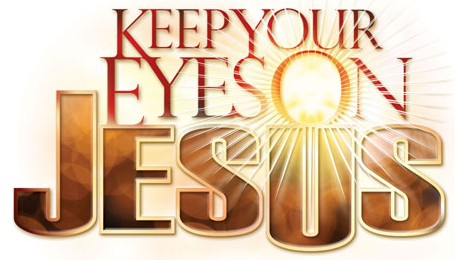
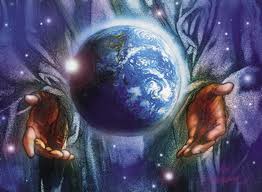
* "for the eyes of men and all the tribes of Israel are on the LORD" -Also can be translated, "For the eye of the Lord is on all mankind, as well as on the tribes of Israel". The thought is that the eyes of all men are going to be on the Lord. Jesus' second coming will be seen by all on the earth. Jesus taught, "At that time the sign of the Son of Man will appear in the sky, and all the nations of the earth will mourn. They will see the Son of Man coming on the clouds of the sky, with power and great glory. And he will send his angels with a loud trumpet call, and they will gather his elect from the four winds, from one end of the heavens to the other." (Matthew 24:30-31)
* "Hadrach" -Hadrach was a Syrian city state on the Orontes known in cuneiform inscription as Hattarika. Assyrian inscriptions frequently mention Hatarikka or Hzrk as an opponent Tiglath-pileser III finally conquered and made part of his empire in 738 B.C. It was apparently the large mound tell Afis, 28 miles south-west of Aleppo, and served as capital of Luhuti, which was an ally of Hamath from 854 to 773.
* "Damascus" -Damascus is said to be the oldest city in the world with a continuous history -reaching from the time of Uz (Noah's grandson) to today. (2 Samuel 8:6; 1 Kings 11:24; 2 Kings 5:12; Act 9:2, 22:6, 26:20; Galatians 1:17) Damascus is about one hundred and fifty miles (200km) north by north-east of Jerusalem. It was at the center of a vast commercial network and caravan trade routes for most of its history. Tablets from the Syrian center of Ebla mention Damascus about 2300 B.C. Thutmose III of Egypt claimed to have conquered Damascus about 1475 B.C. The Hittites battled Egypt for control of Damascus until the Hittites were defeated by the Sea Peoples about 1200 B.C. At this time Arameans from the nearby desert came in and took control of an independent Damascus, gradually establishing a political power base. Abraham chased invading kings north of Damascus to recover Lot, whom they had taken captive (Gen. 14:15). Abraham's servant Eliezer apparently came from Damascus (Gen. 15:2). It had been conquered by David and is a part of the Promised Land. (2 Sam. 8:5-6) After Israel split in two Damascus dominated and controlled the northern kingdom. (2 Kings 13:7) Having fought against Damascus in campaigns in 853 (Battle of Qarqar), 849, 848, and 845 B.C., Shalmaneser III of Assyria severely weakened Damascus, besieging it in 841 and then receiving tribute again in 838. Damascus was defeated by the Assyrians in 797 B.C. (2 Kings 14:26-27) Jeroboam II, king of the northern kingdom (Samaria) took control of the area that had been vacated by the Assyrians. Damascus under the northern kingdom again fell to the Assyrians in 732 B.C. Damascus sought to gain independence from Assyria in 727 and 720 but without success. In 721 B.C. Samaria fell to Assyria ending the northern kingdom of Israel. Later, Damascus was capital of an important city-state in Syria. Their hostility toward the people of God culminated in the "abomination that causes desolation" (Da 11 :31), identified historically with the reign of Antiochus IV Epiphanes (175-164 B.C.). In New Testament times Paul meet Jesus on the way to Damascus to arrest Christians there. After his conversion Paul preached the gospel effectively there. (Acts 9:1-27, 22:1-20; and 2 Corinthians 11:32; Galatians 1:17) Thus Damascus became a captive state of first the Assyrians, then the Babylonians, Persians, Greeks, Ptolemies, and Seleuccids. Finally, Rome gained control under Pompey in 64 B.C.
* "Hamath too, which borders on it" -Hamath was a sity-state located in the valley of the Orontes River, roughly 120 miles north of Damascus. Excavation indicates this mound was occupied as early as Neolithic times. Hieroglyphic inscriptions first discovered by J. L. Burckhardt in 1810 attest early Hittite influence in Hamath. Throughout much of its existence, Hamath functioned as the capital of an independent kingdom. The southern boundary of Hamath served as the northern boundary of Israel during the reigns of Solomon (1 Kings 8:65; 2 Chron. 8:4) and Jeroboam II (2 Kings 14:25,28). The entrance of Hamath” was treated as the northern border of Israel (Num. 34:8; Josh. 13:5; Ezek. 47:15-17,20; 48:1) and served as an accepted geographical expression (Num. 13:21; Judges 3:3). In 738 B.C. Tiglath-pileser III of Assyria exacted tribute from Hamath together with other states including Israel. Following the fall of Samaria in 722-721 B.C., Hamath was devastated in 720 B.C. by Sargon II of Assyria (Amos 6:2). Refugees from Samaria may have been exiled to Hamath by the Assyrians, while refugees from Hamath were brought to Samaria along with their god, Ashima (2 Kings 17:24,30; Isa. 11:11). From this time, Hamath’'s history seems to merge with that of Damascus (Jer. 49:23). (Holman Bible Dictionary) Harmath is modern Hama.
* "Tyre" -Tyre was the senior Phoenician port and city assigned to Assure, but never obtained. (Joshua 19:29) David signed a treaty of "brotherhood" with it (1 Kings 5:1), as did Solomon (1 Kings 5:12) Ahab (1 Kings 16:30-31). The original island city of Tyre had two harbors, one on the south side and the other on the north side of the island. It was these two harbors that enabled Tyre to gain the maritime prominence that it did; the harbor on the north side of the island was, in fact, one of the best harbors on the eastern end of the Mediterranean. Tyre was often attacked by Egypt, besieged by Shalmaneser V, who was assisted by the Phoenicians of the mainland, for five years, and by Nebuchadnezzar. The Tyrians held off Nebuchadnezzar's siege for thirteen years, resupplying the walled island city through its two harbours. The siege ended when Tyre agreed to pay a tribute. Later, a king of Cyprus took Tyre using his fleet in the 370s B.C.
* "Sidon" -Sidon like its sister city Tyre was on the Mediterranean Sea, north west of Samaria. Canaan was the father of Sidon his firstborn. Later the Canaanite clans scattered and the borders of Canaan reached from Sidon toward Gerar as far as Gaza, and then toward Sodom, Gomorrah, Admah and Zeboiim, as far as Lasha.
* "Ashkelon" -Ashkelon is about forty-fifty miles (70km) south west of Jerusalem and north of Gaza, just off the Mediterranean Sea. It was one of the five chief Philistine cities mentioned in the Old Testament. According to Joshua it was within Judah's original border. (Deut. 2:23; Josh. 10:41, 11:22, 15:45-47; Judges 1:18)
* "Gaza" -Gaza is about fifty miles (80km) south west of Jerusalem, just off the Mediterranean Sea. It was one of the five chief Philistine cities mentioned in the Old Testament. According to Joshua it was within Judah's original border. (Deut. 2:23; Josh. 10:41, 11:22, 15:45-47; Judges 1:18) Since the Arab-Israel war in 1948 A.D. Gaza is used to describe the city and strip of land on the Mediterranean Sea. Gath was located within modern day Israel, not the Gaza Strip. In 1967 Israel regained control of Gaza during the six day war only to give the land up to "ensure peace". Gaza is now controlled by the Palestinians. Gath is still within modern Israel's boarder.
* "Ekron" -Ekron is about forty miles (65km) west of Jerusalem. Ekron and Gath were the only two Philistine city not on the Mediterranean Sea. Ekron was one of the five chief Philistine cities mentioned in the Old Testament. According to Joshua it was within Judah's original border. (Deut. 2:23; Josh. 10:41, 11:22, 15:45-47; Judges 1:18)
* "Ashdod" -Ashdod is about forty miles (65km) south west of Jerusalem, just off the Mediterranean Sea. It was one of the five chief Philistine cities mentioned in the Old Testament. According to Joshua it was within Judah's original border. (Deut. 2:23; Josh. 10:41, 11:22, 15:45-47; Judges 1:18)
* "Foreigners will occupy Ashdod" -After the exile the foreign population increased until its name was changed to Palestine. (Nehemiah 13:23-24)
* "Philistines" -The five major Philistine cities were Ashkelon, Gaza, Gath, Ekron, and Ashdod. (Josh. 13:1-3)
* "though they are very skilful" -The Philistines strength ever since the Israelites entered Canaan was that their weapons were made of steel. During the times of judges the Israelites had to go to the Philistines to buy and sharpen their steel farm tools. When David killed the Philistine Goliath he took his huge steel sword.
* "will see it and fear" -In the 620s B.C. the Scythians (outlandish barbarians) invaded Canaan. They came quickly on horses from southern Russia (just north of Assyria). They destroyed the Philistine cities of Ashkelon and Ashdod, going along the Mediterranean Sea and right past Judah. They went as far as the Egyptian boarder who paid them off to stop them from destroying them. Later, the Assyrians and then the Babylonians came and controlled the land of the Philistines. Ever since Israel was made a nation in 1948 A.D. those who live in the land where the Philistines lived have attacked and harassed Israel. They will join the forces who will attack Israel again very soon. They will be defeated and the survivors will fear the God of the Jews who defeated them in one day.
* "writhe in agony" -When their armies lose as noted above they will realize that Allah is not a God and the Lord and God of Israel is stronger.
* "her hope will wither" -When the above defeat takes place the Palistinians along with the nations allied with them will realize their sin and that Israel who in record numbers is accepting Jesus as the Messiah will never be defeated again.
* "I will take the blood from their mouths, the forbidden food from between their teeth" -Idolatrous sacrifices contained the blood of animals. (Ezekiel33:25) Noah was permitted to eat meat after the flood, but not with its blood in it. (Genesis 9:4) The Israelites were not permitted to eat meat with blood in it. (Leviticus 15:29) When Gentiles were accepting Jesus as Lord and entering the church they were not to eat meat with blood in it. (Acts 15:29)
* "Ekron will be like the Jebusites" -The Jebusites were the Canaanites (Genesis 10:15-16, 15:18-21) who Israel defeated and wiped out when they entered the Promised Land (Joshua 9:1-2, 15:63). Some remained into David's time who accepting them into Judah. (2 Samuel 5:6-10; 2 Chronicles 8:7-8)
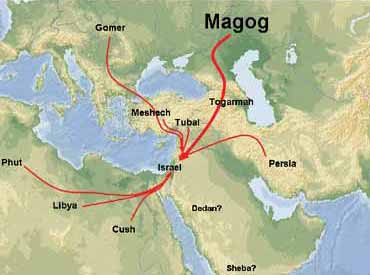
*Zechariah may be describing the defeat in Psalm 83 or the defeat as Ezekiel 37-38. See a map based on Ezekiel's invasion to the right. The difference between the battles in Psalm 83 and Ezekiel are the nationns involved and in Psalm 83 Israel wins the battle and in Ezekiel only the Lord fights the battle. Most believe the Psalm 83 and Ezekiel battles take place before the seven years of tribulation.
* Zechariah 9:1-8 is a prophecy first proclaimed around 520 BC.
The poetic prophecy is a judgement against Gentile nations that boarder Israel. They were trying to stop the rebuild of the temple that had just resumed through the faith of God's people.
The judgement belongs to any nation, city and people who oppose God's will and go their own selfish ways. A judgement is coming to those who resist the Spirit. The judgement was fulfilled.
The truth that this will again be fulfilled is seen in the amazing promise the Lord gives to some Gentiles who survive the judgement of their lands, "Those who are left will belong to our God and become a clan in Judah, and Ekron will be like the Jebusites." Jesus predicted this too. The apostles saw many Gentiles come to faith in Jesus.
Then God promised all his people, "But I will encamp at my temple to guard it against marauding forces. Never again will an oppressor overrun my people, for now I am keeping watch." That was true in Zechariah's day and with the temple being his people it is true now.
I have been thinking about what the Jews did when they repented of complacency and obeyed the prophets Zechariah and Haggai by restarting the rebuild of the temple. 10 years earlier they had stopped when neighbor countries compelled the king to issue a stop order. Now they resumed, going against the stop order and putting themselves in great peril. They choose to obey God. So now through Zechariah the Lord encourages them with these promises. Sometimes God wants me to decide to obey him even at personal sacrifice and risk. It takes faith. Then he encourages me once I obey.
>What useless things did they trust their future to? (3-4)
* Zechariah 9:3-4 "Tyre has built herself a stronghold; she has heaped up silver like dust, and gold like the dirt of the streets. But the Lord will take away her possessions and destroy her power on the sea, and she will be consumed by fire."
* "a stronghold" -Cities always built walls with towers in them and on the edge of their border they built strongholds. The strongholds contained soldiers and many weapons. Tyre's stronghold was its city built on an island. They then abandoned the old city which was on the coast.
* "heaped up silver" -Tyre grew rich on its trading and sea port. The money was used to build up defences, make allies, and pay off invaders.
* "gold like the dirt"-The same as above.
* "the Lord will take away her possessions and destroy her power on the sea, and she will be consumed by fire" -Modern excavations have confirmed that Tyre was burned. This will happen again.
>Who will be left? (7b)
* Zechariah 9:7b "Those who are left will belong to our God and become leaders in Judah"
* "Those who are left" -Not everyone will be killed when Jesus comes again. A few people will remain on the earth. Those who remain will have accepted Jesus as Lord and refused to take the mark of the beast.
* "will belong to our God" -The foreigners in verse 6 are the people who will belong to God. They are followers of Christs.
* "become leaders in Judah" -Jesus told his disciples, "You are those who have stood by me in my trials. And I confer on you a kingdom, just as my Father conferred one on me, so that you may eat and drink at my table in my kingdom and sit on thrones, judging the twelve tribes of Israel." (Luke 22:28-30) The same is true for those who believe the gospel they preached. Jesus said, "To him who overcomes, I will give the right to sit with me on my throne, just as I overcame and sat down with my Father on his throne. He who has an ear, let him hear what the Spirit says to the churches." (Revelation 3:21-22) That is why Jesus is called, "KING of kings and LORD of lords."
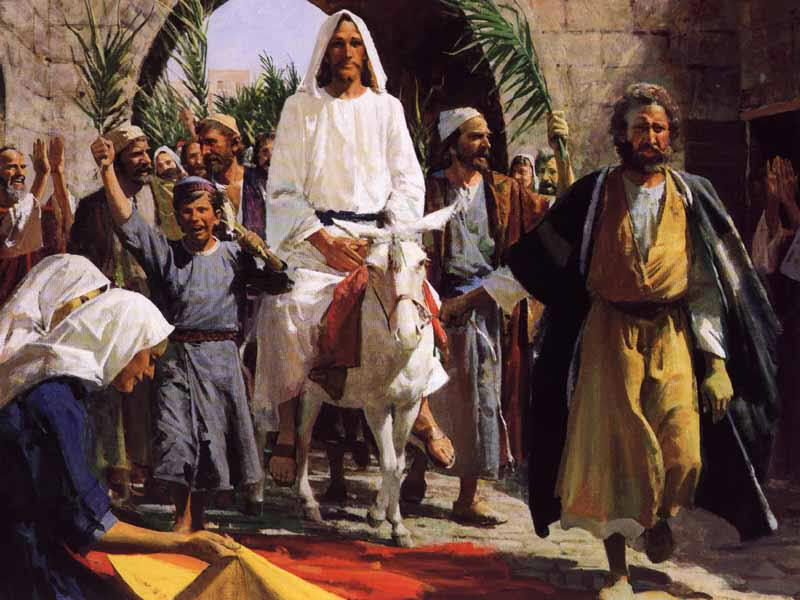
>What does the Lord promise them? (8)
* Zechariah 9:8 "But I will defend my house against marauding forces. Never again will an oppressor overrun my people, for now I am keeping watch."
* "But I will defend my house against marauding forces" -After Zechariah proclaimed this the Greeks under Alexander the Great came and controlled Judah without a fight. After the Greeks set up an abomination on the temple the Maccabean revolts began and were partially successful although outside forces often were involved in their politics. Eventually Herod and the Romans gained control again without a fight. Jerusalem ended in a great battle in 70 A.D. when Rome destroyed the city and emptied the towns of Judea. This judgement came because they rejected their King, Jesus. Since a nation, Rome defeated Judea this promise refers to a time when they will accept Jesus as their King. He will then protect them. As mentioned above as more and more Jews accept Jesus as the Messiah, this will be fulfilled very soon.
* "Never again will an oppressor overrun my people" -Oppressor here in Hebrew means slave driver such as the Egyptians, Assyrians, Babylonians, Romans, Spain, Germany, and others who oppressed them. When Jesus comes again this will be true.
* "for now I am keeping watch" -The Lord himself will watch. When anyone decides to invade Israel he will defend it.
* Commentaries say that 9:1-8 probably refer to Alexander the Greek. Although this may be true in a vague sense, it has further and more important meaning as mentioned above.
* 4:10 and 7:14 are very similar to this verse.
>2. What did Zechariah predict about Jesus' first coming? (9; Matt. 21:1-11)
* Zechariah 9:9 "Rejoice greatly, O Daughter of Zion! Shout, Daughter of Jerusalem! See, your king comes to you, righteous and having salvation, gentle and riding on a donkey, on a colt, the foal of a donkey."
* See drawings of Jesus on a colt to the right. Author of the top is unknown. The bottom one is by Dore.
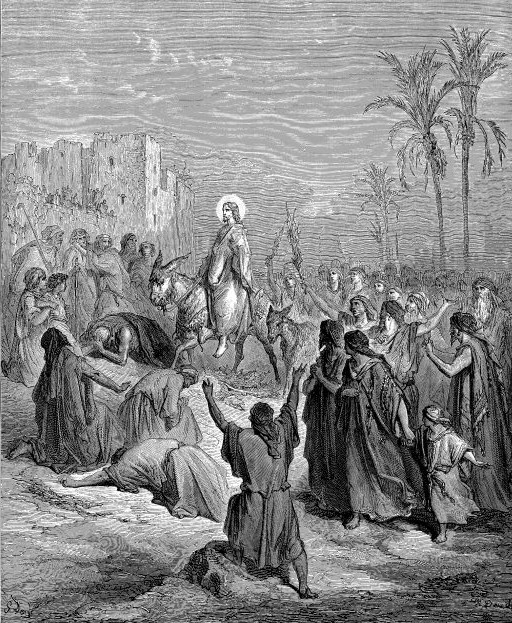
* Matthew 21:1-11 "As they approached Jerusalem and came to Bethphage on the Mount of Olives, Jesus sent two disciples, saying to them, "Go to the village ahead of you, and at once you will find a donkey tied there, with her colt by her. Untie them and bring them to me. If anyone says anything to you, tell him that the Lord needs them, and he will send them right away." This took place to fulfill what was spoken through the prophet: "Say to the Daughter of Zion, 'See, your king comes to you, gentle and riding on a donkey, on a colt, the foal of a donkey.'" The disciples went and did as Jesus had instructed them. They brought the donkey and the colt, placed their cloaks on them, and Jesus sat on them. A very large crowd spread their cloaks on the road, while others cut branches from the trees and spread them on the road. The crowds that went ahead of him and those that followed shouted, "Hosanna to the Son of David!" "Blessed is he who comes in the name of the Lord!" "Hosanna in the highest!" When Jesus entered Jerusalem, the whole city was stirred and asked, "Who is this?" The crowds answered, "This is Jesus, the prophet from Nazareth in Galilee."
* "Daughter of Zion" -The names of Hebrew towns are feminine.
* "your king comes to you" -Jesus is king of the Jews and of all Israel.
* "righteous and having salvation" -Jesus was without sin and thus was righteous. When on the cross he took the sins of the world onto his body thus bringing salvation to anyone who believes in him.
* Jesus conquered sin and death for his people. Jesus is the King who shed his own blood, not the blood of others.
* "gentle" -Jesus said, "Come to me, all you who are weary and burdened, and I will give you rest. Take my yoke upon you and learn from me, for I am gentle and humble in heart, and you will find rest for your souls. For my yoke is easy and my burden is light." (Matthew 11:28-30)
* "a donkey... with her colt" -Long before this the judges road white donkeys. Judges 5:10-13 states, "You who ride on white donkeys, sitting on your saddle blankets, and you who walk along the road, consider the voice of the singers at the watering places. They recite the righteous acts of the Lord, the righteous acts of his warriors in Israel. Then the people of the Lord went down to the city gates. 'Wake up, wake up, Deborah! Wake up, wake up, break out in song! Arise, O Barak! Take captive your captives, O son of Abinoam.' Then the men who were left came down to the nobles; the people of the Lord came to me with the mighty."
* When Jesus rode in a donkey and its colt were there so that the prophecy would be fulfilled exactly. They symbolized humility, peace and Davidic royalty. (Zech. 9:9; Luke 19:30; Num. 19:2; Duet. 21:3; and 1 Sam. 6:7)
* Conquering kings rode horses. Donkeys are no good in battles. Jesus was not a conquering king for his entry just befoer his death. Through riding a donkey he declaring his kingship, a humble and gentle kingship.
* Kings on horses aren't accessible. Concurring kings are surrounded by guards and soldiers, also making them inaccessible. Jesus was accessible on a donkey with no soldiers around him.
* Psalms 24:7-10 states, "Lift up your heads, O you gates; be lifted up, you ancient doors, that the King of glory may come in. Who is this King of glory? The Lord strong and mighty, the Lord mighty in battle. Lift up your heads, O you gates; lift them up, you ancient doors, that the King of glory may come in. Who is he, this King of glory? The Lord Almighty-- he is the King of glory."
* Isaiah 63:1 "Who is this coming from Edom, from Bozrah, with his garments stained crimson? Who is this, robed in splendor, striding forward in the greatness of his strength? "It is I, speaking in righteousness, mighty to save."
* Zephaniah 3:14-15 "Sing, O Daughter of Zion; shout aloud, O Israel! Be glad and rejoice with all your heart, O Daughter of Jerusalem! The LORD has taken away your punishment, he has turned back your enemy. The LORD, the King of Israel, is with you; never again will you fear any harm."
* John 1:10-11 states, "He was in the world, and though the world was made through him, the world did not recognize him. He came to that which was his own, but his own did not receive him."
* Genesis 49:10-12 "The scepter will not depart from Judah, nor the ruler's staff from between his feet, until he comes to whom it belongs and the obedience of the nations is his. He will tether his donkey to a vine, his colt to the choicest branch; he will wash his garments in wine, his robes in the blood of grapes. His eyes will be darker than wine, his teeth whiter than milk."
* Zechariah passed over the centuries between Jesus' first and second coming. All the other prophets did the same. The church age is a long gap of little predictions fulfilled. Still there are some prophecies about the two thousand years between Jesus' two comings. Zechariah does not mention them here.
* For two thousand years now Jesus' kingdom has grown not by war and conquest, but by peacefully preaching the good news, the gospel.
* Zechariah 2:10-13 "Shout and be glad, O Daughter of Zion. For I am coming, and I will live among you," declares the LORD. "Many nations will be joined with the LORD in that day and will become my people. I will live among you and you will know that the LORD Almighty has sent me to you. The LORD will inherit Judah as his portion in the holy land and will again choose Jerusalem. Be still before the LORD, all mankind, because he has roused himself from his holy dwelling."
* The date is around 520 BC. The temple is still being built. The few returned exiles live around Jerusalem.
Jesus is all about these verses. His first coming to Jerusalem, humble and approachable on a donkey.
It speaks of his work through the Holy Spirit after he ascended into heaven and till he comes again. He has reshape Judah with the New Covenant in his blood. Gentiles are pouring into the New Covenant.
It speaks of his coming again to Jerusalem in glory with his people. Jesus said that I am to continue the kingdom work as long as I walk on this earth. Then when he comes I will join him in the air and descend with him to this world. I go through hardship, trouble and happy times too. He says, "The Lord their God will save his people on that day as a shepherd saves his flock. They will sparkle in his land like jewels in a crown. How attractive and beautiful they will be. Grain will make the young men thrive, and new wine the young women.'
>What did he predict about Jesus second coming? (10)
* Zechariah 9:10 "I will take away the chariots from Ephraim and the war-horses from Jerusalem, and the battle bow will be broken. He will proclaim peace to the nations. His rule will extend from sea to sea and from the River to the ends of the earth.
* "I will take away" -This prophecy must refer to a time after Zechariah. See below for reasoning.
* "Ephraim" -Ephraim was one of the names of the northern Israelite nation during the times of the kings of Israel (centuries before Zechariah). Israel was another name for it. Ephraim was the half Israelite/Egyptian son of Joseph. Ephraim's territory became the location of the capital city, Samaria. Samaria was completely destroyed by Assyria. The tribe of Ephraim was taken into captivity along with the other nine tribes of Israel. Very few returned and those who did blended into the many Jews who also returned. Since Ephraim (Israel) didn't exist at this time Zechariah must be refering to some other time and something else. See below for how this verse was fulfilled and more on Ephraim.
* "He" -"He here could refer to Ephraim or King Jesus. Most believe it refers to Jesus. However since Jesus is the head of the church and we are his body, thus the two becoming one, it refers to Jesus and his church coming in glory at the end of the seven years of tribulation.
* "He will proclaim peace to the nations" -The gospel is the message of peace with God. Jesus, as Zechariah noted above, is the King of Peace. (Hebrews 7:1-3) Jesus gave us the message of peace, the good news, the gospel. The Gentiles and Jews who preach the gospel fulfilled this prophecy. Jesus said that the gospel would be preached to all the earth. The gospel has now been preached to the ends of the earth.
* "His rule will extend from sea to sea" -Ocean to ocean.
* "the River to the ends of the earth" -The River could refer to the boarders of Israel during the Millenium as describe elsewhere. If so the River the Euphrates and/or the Wadi River in Egypt. These are the boarders of the promised land.
* Psalm 72:7-8 "In his days the righteous will flourish; prosperity will abound till the moon is no more. He will rule from sea to sea and from the River to the ends of the earth."
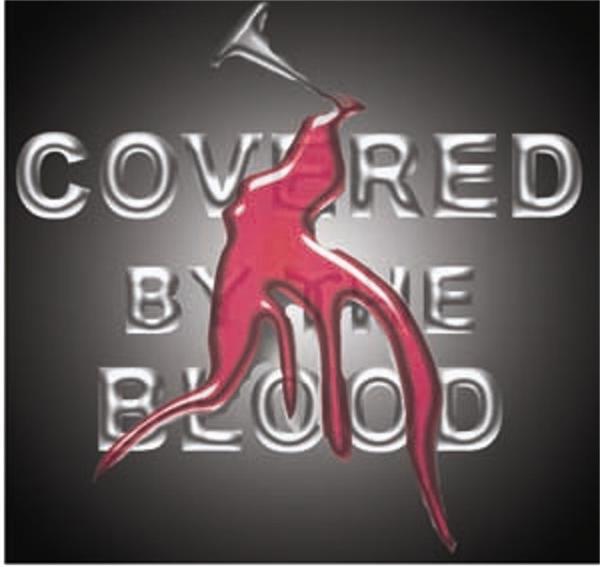
>What did the Lord promise he would do because of the blood of his covenant? (11-13; Matt. 26:27-28)
* Zechariah 9:11-13 "As for you, because of the blood of my covenant with you, I will free your prisoners from the waterless pit. Return to your fortress, O prisoners of hope; even now I announce that I will restore twice as much to you. I will bend Judah as I bend my bow and fill it with Ephraim. I will rouse your sons, O Zion, against your sons, O Greece, and make you like a warrior's sword."
* Matthew 26:27-28 "Then he took the cup, gave thanks and offered it to them, saying, "Drink from it, all of you. This is my blood of the covenant, which is poured out for many for the forgiveness of sins."
* "the blood of my covenant" -When the Lord makes covenants with people he often seals it with blood. The covenant with Abraham was sealed in blood of a heifer, a goat, a ram, a dove, and a pigeon. (Genesis 15) The Lord's covenant with Israel was sealed with the blood of the lamb. (Exodus 12) The new covenant is sealed not with the blood of animals but with the blood of Jesus. (Luke 22:20)
* "I will free your prisoners from the waterless pit" -Hades (death) and sin are described in poetic form, a waterless pit. A person in a waterless pit cannot got out as was the case of Joseph and Jeremiah. (Genesis 37:23-24; Jeremiah 38:6) A prisoner is a person who belonged to a kingdom but was captured. This is a good description of mankind. We were made in the image of God, belonged to him, and are loved by him. Satan deceived Eve and man fell from the kingdom of God, becoming a prisoner held by Satan by the power of sin and the fear of death. As a prisoner we have no rights, no freedom, and are subject and helpless to every whim and desire of our captive. Jesus freed us from this captivity through his blood. Jesus taught, "I tell you the truth, everyone who sins is a slave to sin. Now a slave has no permanent place in the family, but a son belongs to it forever. So if the Son sets you free, you will be free indeed." (John 8:34-36) Some claim this verse is about the Jews still in Babylon. Though they may have taken this verse to them it finds fulfillment in Jesus.
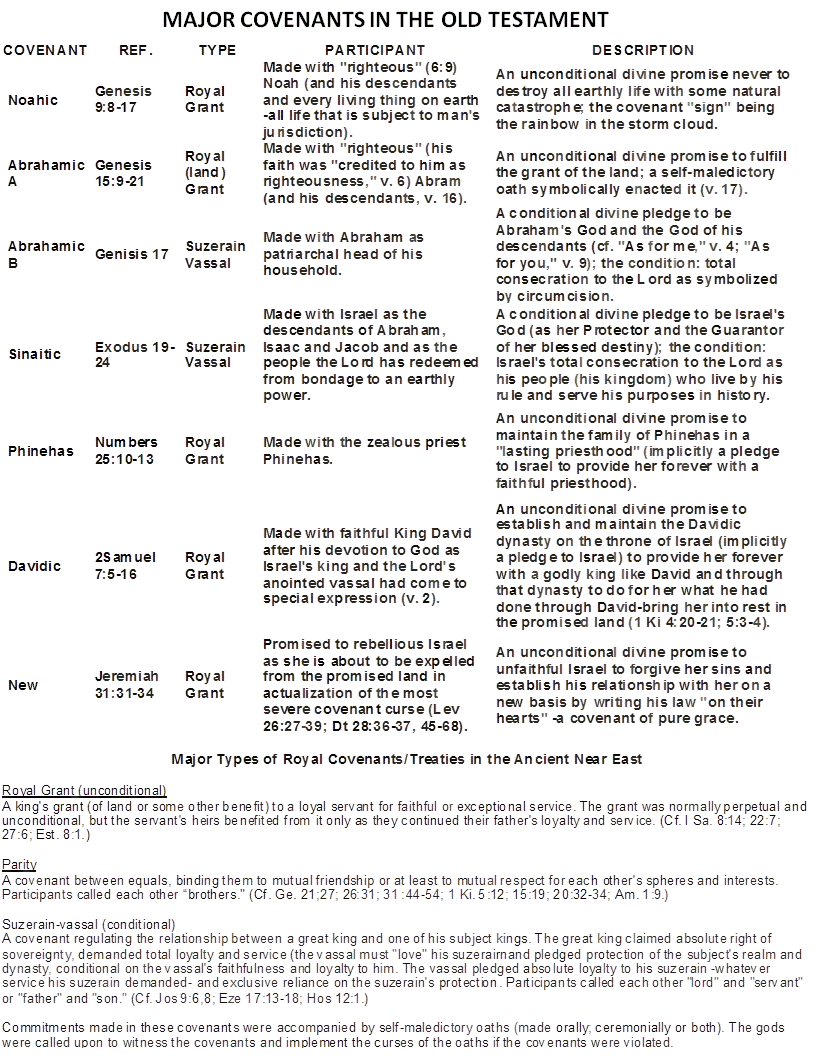
* "Return to your fortress, O prisoners of hope" -The Jews may have taken this in Zechariah's time to refer to Jerusalem. However, 2:5 indicates the the Lord himself is our fortress. The Lord told Abraham, "Do not be afraid, Abram. I am your shield, your very great reward." (Genesis 15:1)
* "even now I announce that I will restore twice as much to you" -Jerusalem and Judah was never restored to the splendor during the reigns of David, Solomon, and Hezekiah. When Jesus comes again he will rule in Jerusalem and it will be of greater splendor than these three kings. Yet, the restoration here is those who were held prisoners. Jesus said, "The thief comes only to steal and kill and destroy; I have come that they may have life, and have it to the full." (John 10:10) Paul wrote, "Praise be to the God and Father of our Lord Jesus Christ, who has blessed us in the heavenly realms with every spiritual blessing in Christ." (Ephesians 1:3)
* "I will bend Judah as I bend my bow and fill it with Ephraim" -The image is the Lord is the warrior who uses Judah and Ephraim as his weapons of choice. Judah was only one tribe from the southern kingdom. Ephraim is only one tribe of the northern kingdom. Both are the leading tribes of the two kingdoms that came from David's kingdom. Here and elsewhere in the Bible these two are used to represent the rest of the tribes in each of the two kingdoms. The Lord does not use Judah and Ephraim separately, but uses them in tandem. Separate they are useless. Together they are a mighty weapon. From the Jews came the Messiah and Ephraim, the Gentiles were shot out from them with the gospel of the Messiah.
* "I will rouse your sons, O Zion" -The Jews and Gentiles who accept the Messiah are sons of Zion. Through the Holy Spirit we are stirred to do the Lord of Zion's work.
* "against your sons, O Greece" -Greece in Zechariah's time was nothing but a far off group of islands that had nothing to do with the Jews who returned from Babylon. Centuries later Alexander the Great and Greece did occupy Judah. The Maccabean revolt used this verse to inspire their revolt and almost succeeded in driving out Greece's political arm. They, however did not get rid themselves of Greek culture which flourished in Judea up to Jesus' birth. So this does not refer to the Maccabean. Rather, as with the rest of these verses has to do with the gospel of Jesus Christ. (Acts 17:4, 12, 17, 18:4, 19:10, 17, 20:21; Romans 1:14) Paul wrote, "The body is a unit, though it is made up of many parts; and though all its parts are many, they form one body. So it is with Christ. For we were all baptized by one Spirit into one body--whether Jews or Greeks, slave or free--and we were all given the one Spirit to drink." (1 Corinthians 12:12-13)
* "make you like a warrior's sword" -The word of God is described like a sword. (Hebrews 4:12) The gospel is the word of God. When we preach the gospel as given to us from the Lord Jesus we are weapons in the spiritual battle.
* Obadiah 1:18 "The house of Jacob will be a fire and the house of Joseph a flame; the house of Esau will be stubble, and they will set it on fire and consume it. There will be no survivors from the house of Esau." The LORD has spoken."
* This is the prophetic regathering of both houses of Israel. (Isaiah 18:3, 7, 27:12-13, 48:1-14; Joel 2:15-32)
>3. What will happen when Jesus comes from above? (14-15; Mark 14:61-62; Acts 1:11; Rev. 19:11-16)
* Zechariah 9:14-15 "Then the LORD will appear over them; his arrow will flash like lightning. The Sovereign LORD will sound the trumpet; he will march in the storms of the south, and the LORD Almighty will shield them. They will destroy and overcome with sling stones. They will drink and roar as with wine; they will be full like a bowl used for sprinkling the corners of the altar."
* Mark 14:61-62 "But Jesus remained silent and gave no answer. Again the high priest asked him, "Are you the Christ, the Son of the Blessed One?" "I am," said Jesus. "And you will see the Son of Man sitting at the right hand of the Mighty One and coming on the clouds of heaven."
* Acts 1:11 "Men of Galilee," they said, "why do you stand here looking into the sky? This same Jesus, who has been taken from you into heaven, will come back in the same way you have seen him go into heaven."
* Revelation 19:11-16 "I saw heaven standing open and there before me was a white horse, whose rider is called Faithful and True. With justice he judges and makes war. His eyes are like blazing fire, and on his head are many crowns. He has a name written on him that no one knows but he himself. He is dressed in a robe dipped in blood, and his name is the Word of God. The armies of heaven were following him, riding on white horses and dressed in fine linen, white and clean. Out of his mouth comes a sharp sword with which to strike down the nations. "He will rule them with an iron scepter." He treads the winepress of the fury of the wrath of God Almighty. On his robe and on his thigh he has this name written: KING OF KINGS AND LORD OF LORDS."
* Joel 2:11 "The LORD thunders at the head of his army; his forces are beyond number, and mighty are those who obey his command. The day of the LORD is great; it is dreadful. Who can endure it?"
* "Then the LORD will appear over them" -Jesus' second coming.
* "his arrow will flash like lightning" -The arrow mentioned in verse 12, Ephraim (Gentile saved by grace).
* "Sovereign Lord" -Sovereign is Adonay in Hebrew. Lord is Yehwih in Hebrew, a variation of YHWH. The combination stresses his honor and majesty.
* "LORD" -Lord here is not YHWH as noted above. KJV translates this as GOD. English translations capitalize every letter in LORD or GOD.
* "sound the trumpet" -A trumpet will sound when Jesus comes again, the last trumpet as recorded in the book of Revelation.
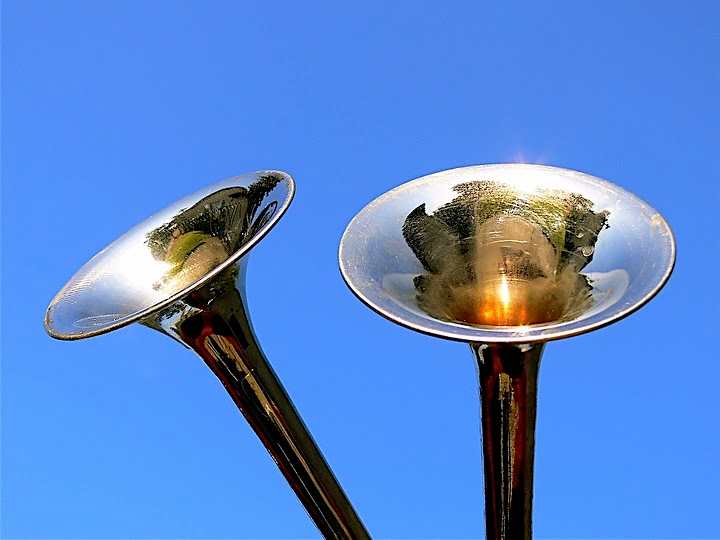
* See a picture of two silver trumpets to the right.
* Numbers 10:1-10 records the purpose of trumpets for Israel. It says, "The LORD said to Moses: "Make two trumpets of hammered silver, and use them for calling the community together and for having the camps set out. When both are sounded, the whole community is to assemble before you at the entrance to the Tent of Meeting. If only one is sounded, the leaders--the heads of the clans of Israel--are to assemble before you. When a trumpet blast is sounded, the tribes camping on the east are to set out. At the sounding of a second blast, the camps on the south are to set out. The blast will be the signal for setting out. To gather the assembly, blow the trumpets, but not with the same signal. The sons of Aaron, the priests, are to blow the trumpets. This is to be a lasting ordinance for you and the generations to come. When you go into battle in your own land against an enemy who is oppressing you, sound a blast on the trumpets. Then you will be remembered by the LORD your God and rescued from your enemies. Also at your times of rejoicing--your appointed feasts and New Moon festivals--you are to sound the trumpets over your burnt offerings and fellowship offerings, and they will be a memorial for you before your God. I am the LORD your God."
* Originally the Lord said each month should begin by observing the first appearance of a new crescent moon. At that time they were to blow a trumpet. (Num. 10:10, Ps. 81:2-4)
* Numbers 10:1-10 and Joshua 6:1-20 state the reasons to blow a trumpet. They are; to call the community together, to call the elders together, to have the Israel camp set out, before going into battle, during a battle, taking a city, at the beginning of each month (new moon), during the time of rejoicing, during the holy feasts, and over burnt offerings and fellowship offerings.
* Basically trumpets were used for announcements for something coming or happening.
* Matthew 24:30-31 "At that time the sign of the Son of Man will appear in the sky, and all the nations of the earth will mourn. They will see the Son of Man coming on the clouds of the sky, with power and great glory. And he will send his angels with a loud trumpet call, and they will gather his elect from the four winds, from one end of the heavens to the other."
* Matthew 13:30 "Let both grow together until the harvest. At that time I will tell the harvesters: First collect the weeds and tie them in bundles to be burned; then gather the wheat and bring it into my barn.'"
* Isaiah 27:12-13 records worshipers being gathered at a trumpet's sounding. It states, "In that day the Lord will thresh from the flowing Euphrates to the Wadi of Egypt, and you, O Israelites, will be gathered up one by one. And in that day a great trumpet will sound. Those who were perishing in Assyria and those who were exiled in Egypt will come and worship the Lord on the holy mountain in Jerusalem." This seems to be the threshing Jesus spoke of in Matthew 13.
* 1 Thessalonians 4:13-18 states, "Brothers, we do not want you to be ignorant about those who fall asleep, or to grieve like the rest of men, who have no hope. We believe that Jesus died and rose again and so we believe that God will bring with Jesus those who have fallen asleep in him. According to the Lord's own word, we tell you that we who are still alive, who are left till the coming of the Lord, will certainly not precede those who have fallen asleep. For the Lord himself will come down from heaven, with a loud command, with the voice of the archangel and with the trumpet call of God, and the dead in Christ will rise first. After that, we who are still alive and are left will be caught up (rapture in Latin) together with them in the clouds to meet the Lord in the air. And so we will be with the Lord forever. Therefore encourage each other with these words." John 5:28-29 record Jesus saying this. "And if I go and prepare a place for you, I will come back and take you to be with me that you also may be where I am." (John 14:3)
* 1 Corinthians 15:50-54 states that at the last trumpet is when Jesus' bride will receive their resurrection bodies. It states, "I declare to you, brothers, that flesh and blood cannot inherit the Kingdom of God, nor does the perishable inherit the imperishable. Listen, I tell you a mystery: We will not all sleep, but we will all be changed-- in a flash, in the twinkling of an eye, at the last trumpet. For the trumpet will sound, the dead will be raised imperishable, and we will be changed. For the perishable must clothe itself with the imperishable, and the mortal with immortality. When the perishable has been clothed with the imperishable, and the mortal with immortality, then the saying that is written will come true: "Death has been swallowed up in victory." Many in recent years have been confused by this trumpet and ignore the word 'last'".
* The book of Revelation chapters 8 through 11 look forward to the sounding of seven trumpets during the Tribulation; and 4:1 records, "the voice like a trumpet said, 'Come up here...'" The six blasts in chapters 8 and 9 are judgments. The last according to 1 Cor. 15 is the rapture.
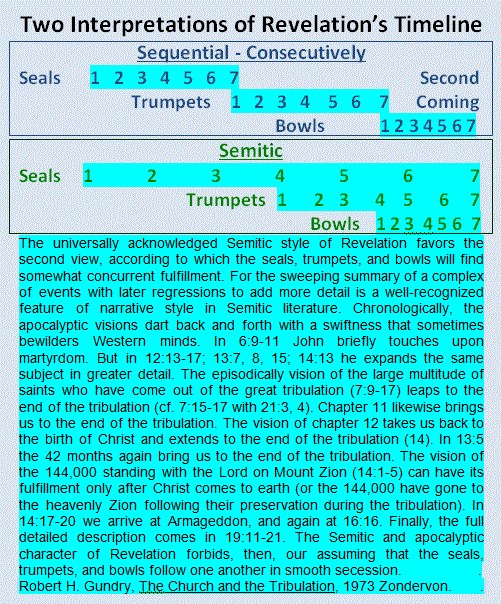
* Revelation records seven trumpets sounding. When the last of the seven trumpets sounds several things will happen including Jesus physically arriving on earth as King. Revelation 11:15-18 states, "The seventh angel sounded his trumpet, and there were loud voices in heaven, which said: 'The kingdom of the world has become the kingdom of our Lord and of his Christ, and he will reign forever and ever.' And the twenty-four elders, who were seated on their thrones before God, fell on their faces and worshipped God, saying: "We give thanks to you, Lord God Almighty, the One who is and who was, because you have taken your great power and have begun to reign. The nations were angry; and your wrath has come. The time has come for judging the dead, and for rewarding your servants the prophets and your saints and those who reverence your name, both small and great-- and for destroying those who destroy the earth."
* Jesus himself said, "At that time the sign of the Son of Man will appear in the sky, and all the nations of the earth will mourn. They will see the Son of Man coming on the clouds of the sky, with power and great glory. [Also in Rev. 6:15.] And he will send his angels with a loud trumpet call, and they will gather his elect from the four winds, from one end of the heavens to the other." (Matt. 24:30-31) Jesus is speaking as Revelation has recorded the ending of the age we are in and the beginning of the next age.
* The Feast of Trumpets (Yom Terium) proclaims the bride's resurrection, God's judgment on the wicked, and Jesus' second coming. (Leviticus 23:23-25)
* Isaiah 18:3 states, "All you people of the world, you who live on the earth, when a banner is raised on the mountains, you will see it, and when a trumpet sounds, you will hear it."
* Some say the trumpet calling us to Jesus is recorded in Revelation. 1:10-11. It states, "On the Lord's Day I was in the Spirit, and I heard behind me a loud voice like a trumpet..." The voice like a trumpet was Jesus speaking. After scribing for Jesus letters to the seven churches, John then wrote, "After this I looked, and there before me was a door standing open in heaven. And the voice I had first heard speaking to me like a trumpet said, "Come up here, and I will show you what must take place after this." (Rev. 4:1) Then the seven trumpets of Revelation are sounded a few chapters later.
Some believe Jesus saying to John, "Come up here,' is the time of the rapture. They say this is the trumpet calling the bride to rise from the grave if deceased and those alive joining them in the air to eventually be taken to heaven, the home Jesus has prepared for his bride. There are two problems with this understanding. First, John did not specifically say that the second time the trumpet voice spoke to him that it sounded like a trumpet.
Second, since this is before the seven trumpets of Revelation how can it be the last trumpet? What trumpets are before it? One stretched possibility is that Israel was to sound a trumpet at the beginning of each month when the crescent of the moon is first seen. (This could take two or three days; no one really knew for sure). Since the Feast of Trumpets is at the first day of the seventh month, then there could be six months trumpets before this one. But they are not recorded in the Bible. Second, since as some believe there are seven ages and the Millennium is the seventh, then it is possible that the sounding of the trumpet to mark the beginning of this feast and month is the last of seven age trumpets. But they are not recorded in the Bible.
The simplest solution is that, "Come up here was only to John and it does not foreshadow the rapture. Rather the rapture is the last of the seven trumpets in Revelation. (From "The Believer's Future - Hope that Inspires" found on this web site.)
* Looking back to the time when Israel was led out of Egypt to Mount Sinai to receive the law of God we see the Lord's descent was accompanied by a trumpet blast. At that time the Lord became Israel's King. The trumpet blasted and the mountain shook and was ablaze with fire and smoke for the Lord descended onto the mountain in fire, and there was lightning and thunder. The Israelites could not approach the mountain because of their sins and needed to be consecrated and have their clothes washed. Moses was told, "Only when the ram's horn sounds a long blast may they go up to the mountain." (Ex. 19-20) Hebrews 12:18-29 tells us that Israel at Mount Sinai foreshadows Jesus' second coming.
* We can also learn about Jesus' coming at the sounding of trumpets from his leading Israel into the Promised Land. Jericho was the first city to be taken. (Jos. 5) During the battle the Lord did all the fighting. The Israelites were told to march around the city once a day for seven days with seven priest blowing seven trumpets at the front of the procession. On the last day they sounded the trumpets and the Lord tore down the walls and the Israelites took the city. (Joshua 6) The Lord tells us this now so that we will understand what he is soon to do upon his return. The seven trumpets of Revelation will sound and evil doers will perish and the righteous will take possession of the land.
* Isaiah 29:5-8 also reveals that Jesus' second coming as King of the Kingdom of God is as the Lord God came down Mount Sinai to became Israel's king. It states, "But your many enemies will become like fine dust, the ruthless hordes like blown chaff. Suddenly, in an instant, the Lord Almighty will come with thunder and earthquake and great noise, with wind storm and tempest and flames of a devouring fire. Then the hordes of all the nations that fight against Ariel (Jerusalem), that attack her and her fortress and besiege her, will be as it is with a dream, with a vision in the night-- as when a hungry man dreams that he is eating, but he awakens, and his hunger remains; as when a thirsty man dreams that he is drinking, but he awakens faint, with his thirst unquenched. So will it be with the hordes of all the nations that fight against Mount Zion." The armies assembled at Megiddo will see Jesus come in glory to Jerusalem.
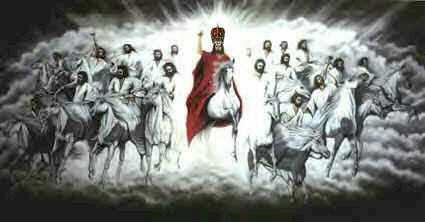
* See a painting of Jesus Coming in Glory to the right.
* "he will march in the storms of the south" -Jesus' second coming is elsewhere depicted as marking from the south. Habakkuk 3:3-4 "God came from Teman, the Holy One from Mount Paran. Selah His glory covered the heavens and his praise filled the earth. His splendor was like the sunrise; rays flashed from his hand, where his power was hidden."
* "Lord Almighty" -Other translations used "Lord of hosts". See notes in the commentary for Zechariah 1:2.
* "will shield them" -Jesus is our shield as he also told Abraham (Genesis 15:1) and Israel (Deuteronomy 33:29). David confessed that the Lord was his shield. (Psalm 119:114)
* "They will destroy and overcome with sling stones" -Slingshots were ancient missile launchers. A round sling stone was placed in the middle of a strap of leather, then whirled overhead. Upon release of one end of the leather the stone would project out of the leather at a high rate of speed, a great example of centrifugal force. Slingshots were a common weapon used by shepherds to fend of vicious animals as David stated. (1 Samuel 17:34-40)
* "They will drink and roar as with wine" -When we come with Jesus we will not be drunk. However, we will roar with joy greater than any wine can give.
* "they will be full like a bowl used for sprinkling the corners of the altar" -Bowls were used to hold the blood of sacrifices in the temple worship. The blood would be poured out on each horn at the four corners of the altar and all around its rim to purify it. (Exodus 43:20)
>What will his flock be like on that day? (16-17)
* Zechariah 9:16-17 "The LORD their God will save them on that day as the flock of his people. They will sparkle in his land like jewels in a crown. How attractive and beautiful they will be! Grain will make the young men thrive, and new wine the young women."
* "will save them on that day as the flock of his people" -Again this is about Jesus' second coming. Jesus death does save us from sin, the power of sin, and the wrath of God. Jesus second coming will save us from death and the oppressive governments of this world. Jesus is the shepherd who leads his flock. Jesus said, "I am the good shepherd. The good shepherd lays down his life for the sheep... I am the good shepherd; I know my sheep and my sheep know me-- just as the Father knows me and I know the Father--and I lay down my life for the sheep. I have other sheep that are not of this sheep pen. I must bring them also. They too will listen to my voice, and there shall be one flock and one shepherd. The reason my Father loves me is that I lay down my life--only to take it up again. No one takes it from me, but I lay it down of my own accord. I have authority to lay it down and authority to take it up again. This command I received from my Father." (John 10:11, 14-18)
* "They will sparkle in his land like jewels in a crown" -When Jesus comes again his followers will be with him in new resurrection bodies.
* "How attractive and beautiful they will be!" -Another description of our resurrection bodies.
* "Grain will make the young men thrive, and new wine the young women" -The blessing of the Lord when Jesus comes again.
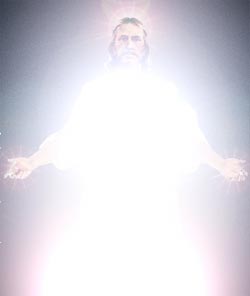
>How is this repeated in 1 Cor. 15:50-53?
* 1 Corinthians 15:50-53 "I declare to you, brothers, that flesh and blood cannot inherit the kingdom of God, nor does the perishable inherit the imperishable. Listen, I tell you a mystery: We will not all sleep, but we will all be changed-- in a flash, in the twinkling of an eye, at the last trumpet. For the trumpet will sound, the dead will be raised imperishable, and we will be changed. For the perishable must clothe itself with the imperishable, and the mortal with immortality."
* When Jesus comes again the dead in Christ will rise from the dead and those who are left on the earth that are in Jesus will be changed. (1 Corinthians 15) Jesus, through these words in 1 Corinthians 15 makes it clear that we will bear his image in a glorious spiritual/physical body. Our physical bodies do not bear his image now, though our spirit has been born again. (John 3:5-8) There is a great future coming for a true believer for if our bodies are just seeds now, how much greater will our bodies be when we are raised from the dead.
Does this mean that our new bodies will be physical in essence? Yes, for Jesus' body is physical in essence. Does this mean that our new body will be spiritual in essence? Yes, for Jesus' body is spiritual in essence. Does this mean our new bodies will be better than our bodies are now? Yes, in ways that we can imagine and can't imagine. Does this mean that God will restore our bodies to that of Adam and Eve? Our new resurrected bodies will be better than Adam and Eve's bodies. Does this mean our body will radiate? Yes, for Jesus radiates with the Glory of God as pointed out in the verses already quoted. This does not mean that we will be like angels who have been made flames of fire. (Heb. 1:8) We will be and are the King's bride.
Some may think it strange that we will radiate with the Glory of God. However, when Moses received the Ten Commandments his face was radiant to the point where he wore a veil when he was among the Israelites. For a long time after that when Moses went in to meet with God in the Tabernacle and came out his face was radiant. (Ex. 34:29-35) Paul points out, 'if the ministry that brought death, which was engraved in letters on stone, came with glory, so that the Israelites could not look steadily at the face of Moses because of its glory, fading though it was, will not the ministry of the Spirit be even more glorious? If the ministry that condemns men is glorious, how much more glorious is the ministry that brings righteousness! For what was glorious has no glory now in comparison with the surpassing glory. And if what was fading away came with glory, how much greater is the glory of that which lasts! (2 Cor. 3:7-11)
Moses was not the only person who radiated with the glory of God because the Spirit of God was on him. When Stephen was standing before the Sanhedrin being judged by them and about to be condemned Acts 6:15 states, "All who were sitting in the Sanhedrin looked intently at Stephen, and they saw that his face was like the face of an angel."
Another verse that states the bride will radiate with the Glory of God is Matthew 13:43a. Jesus said, "Then the righteous will shine like the sun in the kingdom of their Father." Col. 3:4 says we will appear with [Jesus] in glory." Daniel 12 also states that we will shine forever and ever.
Our new resurrection body will by like his glorious body. Jesus said, "he Son of Man will send out his angels, and they will weed out of his kingdom everything that causes sin and all who do evil. They will throw them into the fiery furnace, where there will be weeping and gnashing of teeth. Then the righteous will shine like the sun in the kingdom of their Father." (Matt. 13:41-43)
* The above comments about our resurrection bodies is taken from "The Believer's Future - Hope that Inspires" found on this site.
II. The Lord Will Care for Judah and Ephraim (10:1-11:3)

>4. How is life with and without the Lord different? (1-2)
* Zechariah 10:1-2 "Ask the LORD for rain in the springtime; it is the LORD who makes the storm clouds. He gives showers of rain to men, and plants of the field to everyone. The idols speak deceit, diviners see visions that lie; they tell dreams that are false, they give comfort in vain. Therefore the people wander like sheep oppressed for lack of a shepherd."
* "Ask the LORD for rain in the springtime" -Prayer for blessing trusting he will give it. When a farmer invests in seed and labors in planting he does so with faith in the Lord.
* "He gives showers of rain to men, and plants of the field to everyone." -The trust a farmer has in the Lord has to be total for man cannot make it rain (cloud iodizing indeterminate) and man has no control over whether the seeds will sprout, grow, and produce a harvest.
* Paul speaks of the gospel work in similar terms. 1 Corinthians 3:5-9 records, "What, after all, is Apollos? And what is Paul? Only servants, through whom you came to believe--as the Lord has assigned to each his task. I planted the seed, Apollos watered it, but God made it grow. So neither he who plants nor he who waters is anything, but only God, who makes things grow. The man who plants and the man who waters have one purpose, and each will be rewarded according to his own labor. For we are God's fellow workers; you are God's field, God's building."
* "Therefore the people wander like sheep oppressed for lack of a shepherd." -Jesus said the same about people in his generation. (Mark 6:34) So he taught them.
* When the Lord is with a gospel worker his work flurishes and he will receive a reward. When the gospel worker does not trust in the Lord, he will not gain an eternal harvest.
>How is Jesus leadership better than false shepherds? (3; John 10:11-13)
* Zechariah 10:3 "My anger burns against the shepherds, and I will punish the leaders; for the LORD Almighty will care for his flock, the house of Judah, and make them like a proud horse in battle."
* John 10:11-13 "I am the good shepherd. The good shepherd lays down his life for the sheep. The hired hand is not the shepherd who owns the sheep. So when he sees the wolf coming, he abandons the sheep and runs away. Then the wolf attacks the flock and scatters it. The man runs away because he is a hired hand and cares nothing for the sheep."
* The Lord Jesus takes care of us. He makes us into his instruments and weapons in the spiritual battle.
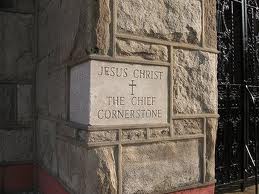
>How is victory possible with Jesus? (4-5; 1 Cor. 15:54-57)
* Zechariah 10:4-5 "From Judah will come the cornerstone, from him the tent peg, from him the battle bow, from him every ruler. Together they will be like mighty men trampling the muddy streets in battle. Because the LORD is with them, they will fight and overthrow the horsemen."
* 1 Corinthians 15:54-57 "When the perishable has been clothed with the imperishable, and the mortal with immortality, then the saying that is written will come true: "Death has been swallowed up in victory." "Where, O death, is your victory? Where, O death, is your sting?" The sting of death is sin, and the power of sin is the law. But thanks be to God! He gives us the victory through our Lord Jesus Christ."
* "From Judah will come the cornerstone" -Jesus was a Jew. The Messiah, the King was to be a Jew as was promised through Jacob just before he died. (Genesis 49:10) Jesus is described as the cornerstone here and elsewhere in the Bible. The cornerstone is the first laid and most important stone in a building. From it all the other stones line up. The cornerstone supports the weight of the stones on it.
* Zechariah uses the term capstone. The Jews were busy building the temple when Zechariah gave his messages. The Lord used terms they were using to build the temple.
* Ephesians 2:19-22 "Consequently, you are no longer foreigners and aliens, but fellow citizens with God's people and members of God's household, built on the foundation of the apostles and prophets, with Christ Jesus himself as the chief cornerstone. In him the whole building is joined together and rises to become a holy temple in the Lord. And in him you too are being built together to become a dwelling in which God lives by his Spirit."
* 1 Peter 2:4-6 "As you come to him, the living Stone--rejected by men but chosen by God and precious to him-- you also, like living stones, are being built into a spiritual house to be a holy priesthood, offering spiritual sacrifices acceptable to God through Jesus Christ. For in Scripture it says: "See, I lay a stone in Zion, a chosen and precious cornerstone, and the one who trusts in him will never be put to shame."
* "the tent peg" -The tent peg holds the tent up.
* "the battle bow" -Earlier Zechariah says Judah was like a battle bow. Here the Messiah is battle bow.
* "from him every ruler" -Plural here implies that Jesus will make his followers kings and lords in the new order when he comes.
* "Together they will be like mighty men trampling the muddy streets in battle" -Joel 2:1-11 "Blow the trumpet in Zion; sound the alarm on my holy hill. Let all who live in the land tremble, for the day of the LORD is coming. It is close at hand-- a day of darkness and gloom, a day of clouds and blackness. Like dawn spreading across the mountains a large and mighty army comes, such as never was of old nor ever will be in ages to come. Before them fire devours, behind them a flame blazes. Before them the land is like the garden of Eden, behind them, a desert waste-- nothing escapes them. They have the appearance of horses; they gallop along like cavalry. With a noise like that of chariots they leap over the mountaintops, like a crackling fire consuming stubble, like a mighty army drawn up for battle. At the sight of them, nations are in anguish; every face turns pale. They charge like warriors; they scale walls like soldiers. They all march in line, not swerving from their course. They do not jostle each other; each marches straight ahead. They plunge through defenses without breaking ranks. They rush upon the city; they run along the wall. They climb into the houses; like thieves they enter through the windows. Before them the earth shakes, the sky trembles, the sun and moon are darkened, and the stars no longer shine. The LORD thunders at the head of his army; his forces are beyond number, and mighty are those who obey his command. The day of the LORD is great; it is dreadful. Who can endure it?"
>5. What motivates the Lord? (6)
* Zechariah 10:6 "I will strengthen the house of Judah and save the house of Joseph. I will restore them because I have compassion on them. They will be as though I had not rejected them, for I am the LORD their God and I will answer them."
* "because I have compassion on them" -Love drives Jesus to save his people.
>What does he promise the Ephraimites? (7-10)
* Zechariah 10:7-10 "The Ephraimites will become like mighty men, and their hearts will be glad as with wine. Their children will see it and be joyful; their hearts will rejoice in the LORD. I will signal for them and gather them in. Surely I will redeem them; they will be as numerous as before. Though I scatter them among the peoples, yet in distant lands they will remember me. They and their children will survive, and they will return. I will bring them back from Egypt and gather them from Assyria. I will bring them to Gilead and Lebanon, and there will not be room enough for them."
* "like mighty men"
* "their hearts will be glad as with wine"
* "Their children will see it and be joyful"
* "I will redeem them"
* "I will bring them back"
>Who are the Ephraimites? (2:11-12; Gen. 46:20, 48:5-6, 19-20, 49:22-27)
* See 9:10-13, question 2 for more information above.
* Zechariah 2:11-12 "Many nations will be joined with the LORD in that day and will become my people. I will live among you and you will know that the LORD Almighty has sent me to you. The LORD will inherit Judah as his portion in the holy land and will again choose Jerusalem."
* The "many nations" of Zechariah 2:11-12 are people from many nations coming to believe in Jesus the Messiah. Paul confirms this in Romans 4:16-18. The phrase "many nations" reflects back to the Lord's promise to Abraham and Jacob. "As for me, this is my covenant with you: You will be the father of many nations. No longer will you be called Abram; your name will be Abraham, for I have made you a father of many nations." (Genesis 17:4-5) Jacob who became Israel was told, "A nation and a community of nations will come from you". (Genesis 35:11) This promise puzzled him until he saw the half Egyptian sons of Joseph, his favorite son. Then he told Joseph, "Now then, your two sons born to you in Egypt before I came to you here will be reckoned as mine; Ephraim and Manasseh will be mine, just as Reuben and Simeon are mine. Any children born to you after them will be yours; in the territory they inherit they will be reckoned under the names of their brothers." (Genesis 48:5-6) Gentiles who accept and confess Jesus' death and resurrection are the "many nations" and the "community of nations".
* Genesis 46:20 "In Egypt, Manasseh and Ephraim were born to Joseph by Asenath daughter of Potiphera, priest of On."
* Genesis 48:5-6 "Now then, your two sons born to you in Egypt before I came to you here will be reckoned as mine; Ephraim and Manasseh will be mine, just as Reuben and Simeon are mine. Any children born to you after them will be yours; in the territory they inherit they will be reckoned under the names of their brothers."
* Genesis 48:19-20 "But his father refused and said, "I know, my son, I know. He too will become a people, and he too will become great. Nevertheless, his younger brother will be greater than he, and his descendants will become a group of nations." He blessed them that day and said, "In your name will Israel pronounce this blessing: 'May God make you like Ephraim and Manasseh.'" So he put Ephraim ahead of Manasseh."
* Genesis 49:22-27 "Joseph is a fruitful vine, a fruitful vine near a spring, whose branches climb over a wall. With bitterness archers attacked him; they shot at him with hostility. But his bow remained steady, his strong arms stayed limber, because of the hand of the Mighty One of Jacob, because of the Shepherd, the Rock of Israel, because of your father's God, who helps you, because of the Almighty, who blesses you with blessings of the heavens above, blessings of the deep that lies below, blessings of the breast and womb. Your father's blessings are greater than the blessings of the ancient mountains, than the bounty of the age-old hills. Let all these rest on the head of Joseph, on the brow of the prince among his brothers. Benjamin is a ravenous wolf; in the morning he devours the prey, in the evening he divides the plunder."
* 1 Peter 2:9-10 "But you are a chosen people, a royal priesthood, a holy nation, a people belonging to God, that you may declare the praises of him who called you out of darkness into his wonderful light. Once you were not a people, but now you are the people of God; once you had not received mercy, but now you have received mercy."
* Jeremiah 31:8-10 "See, I will bring them from the land of the north and gather them from the ends of the earth. Among them will be the blind and the lame, expectant mothers and women in labor; a great throng will return. They will come with weeping; they will pray as I bring them back. I will lead them beside streams of water on a level path where they will not stumble, because I am Israel's father, and Ephraim is my firstborn son. "Hear the word of the LORD, O nations; proclaim it in distant coast lands: 'He who scattered Israel will gather them and will watch over his flock like a shepherd.'"
* Jeremiah 31:20 "Is not Ephraim my dear son, the child in whom I delight? Though I often speak against him, I still remember him. Therefore my heart yearns for him; I have great compassion for him," declares the LORD."
>6. What else does the Lord say about Ephraim? (11)
* Zechariah 10:11 "They will pass through the sea of trouble; the surging sea will be subdued and all the depths of the Nile will dry up. Assyria's pride will be brought down and Egypt's scepter will pass away."
* "They will pass through the sea of trouble" -Jesus said, "I have told you these things, so that in me you may have peace. In this world you will have trouble. But take heart! I have overcome the world." (John 16:33)
* "Egypt... Assyria" -The nations that enslaved Israel will disappear when Jesus comes again.
>After trouble what is promised them? (12)
* Zechariah 10:12 "I will strengthen them in the LORD and in his name they will walk," declares the LORD."
* "his name" -Jesus the Messiah. Jesus is our strength. We walk (live) in Jesus. We do his will.
>How does Jesus give similar words? (John 16:33)
* John 16:33 "I have told you these things, so that in me you may have peace. In this world you will have trouble. But take heart! I have overcome the world."
* True Christians face trouble in the world. Life in Christ is not easy at times. I can speak of this personally. Persecution and ridicule has come to me from non-believers and pretend believers.
>7. What will happen to Lebanon? (11:1-3)
* Zechariah 11:1-3 "Open your doors, O Lebanon, so that fire may devour your cedars! Wail, O pine tree, for the cedar has fallen; the stately trees are ruined! Wail, oaks of Bashan; the dense forest has been cut down! Listen to the wail of the shepherds; their rich pastures are destroyed! Listen to the roar of the lions; the lush thicket of the Jordan is ruined!"
* "Lebanon" -Joshua 13:4-5 states that Tyre (actually all of the land east of the Lebanon Mountain range to the Mediterranean Sea) was part of the land promised to Israel, but not conquered by Joshua. He told them to conquer it. By accepting wood and craftsman from Tyre David was assuring them that he would not attack them. David, though he gained promised land never before conquered, compromised in order to build a large palace for himself. We should be careful that we don't compromise when building our house. The Lebanon Mountains within Sidon and Tyre's territories were known for large trees that provided the beams for the ceiling and gates of the temple.
* "Bashan" -Bashan in modern Hauran region. Joshua 12:4 concerns the race of giants in Bashan, one of the first nation Israel overthrow as they approached the promised land.
* "the Jordan" -The Jordan River gives life to many plants as it flows from the Sea of Galilee to the Salt Sea.
* The nations mentioned here are currently controlled by Islam nations. In 1967 A.D. they joining forces to invade and destroy Israel. They lost. They are once again planning to invade and destroy Israel. The Lord will protect Israel again.
III. Two Shepherds (11:4-17)

>8. How might have the people who just returned from exile receive the message in verses 4-6?
* Zechariah 11:4-6 "This is what the LORD my God says: "Pasture the flock marked for slaughter. Their buyers slaughter them and go unpunished. Those who sell them say, 'Praise the LORD, I am rich!' Their own shepherds do not spare them. For I will no longer have pity on the people of the land," declares the LORD. "I will hand everyone over to his neighbor and his king. They will oppress the land, and I will not rescue them from their hands."
* "the LORD my God says" -Zechariah may be referring to the Lord speaking to him. Yet was the Lord telling him to pasture the flock called Judah? The Jews in Zechariah's time were not sold as slaves. In fact just the opposite was happening. The Assyrians had allowed any Jew to leave Babylon and Assyria and return to Judah. So these words find their fulfillment in Jesus, the Shepherd-King. Jesus' ministry ended in their rejecting him and in 70 A.D. the Jews being either killed or sold as slaves by the Romans. The Lord did not have pity on the people who rejected their Shepherd-King.
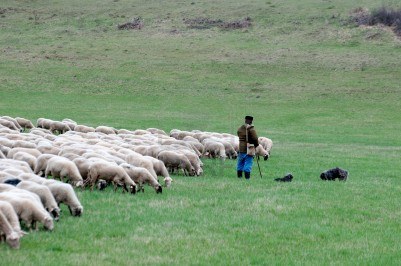
* "Pasture the flock marked for slaughter." -The Lord was with the Israelites while in captivity in Egypt as slaves. Jesus also pastured the apostles who were all martyred. As mentioned above all of Israel were slaughtered by the Romans in 70 A.D.
* "Their own shepherds do not spare them." -The Jewish religious and civil leaders used their fellow countrymen to make themselves rich and comfortable. This was forbidden in the Mosaic laws. Jesus taught his disciples that Christian leadership is to serve others, not be served. Sadly many who call themselves Christian leaders have not kept this command either.
* "For I will no longer have pity on the people of the land" -When Zechariah wrote this the Jews were under Assyrian control. Only a few had left Assyria to live in Jerusalem. The temple was not completed and the walls were in ruin. The Lord had pity on his people. Yet because of their stubborn hearts his compassion and patience wore thin. Eventually they rejected Jesus their Shepherd-King and punishment came and has lasted two thousand years.
* "I will hand everyone over to his neighbor and his king." -Judah had no human king from the line of David at this time. Assyria was their masters. Then Greece was their masters. After the Maccabees the Romans were their masters. When Jesus was tried before Pilate the crowd of Jews proclaimed, "Take him away! Take him away! Crucify him!" "Shall I crucify your king?" Pilate asked. "We have no king but Caesar," the chief priests answered." (John 19:15) And so the Jews were handed over to the Romans.
* "They will oppress the land, and I will not rescue them from their hands." -The Romans completely destroyed the Jews in 70 A.D.
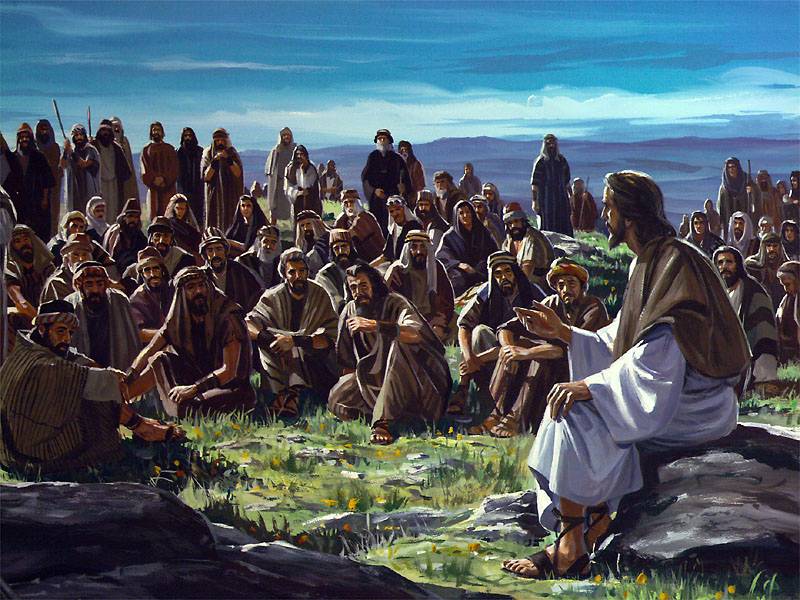
>What does verse 7-9 mean?
* Zechariah 11:7-9 "So I pastured the flock marked for slaughter, particularly the oppressed of the flock. Then I took two staffs and called one Favor and the other Union, and I pastured the flock. In one month I got rid of the three shepherds. The flock detested me, and I grew weary of them and said, "I will not be your shepherd. Let the dying die, and the perishing perish. Let those who are left eat one another's flesh."
* "I pastured the flock marked for slaughter" -The Lord was with the Israelites while in captivity in Egypt as slaves and again during Jesus' ministry.
* "particularly the oppressed of the flock" -The Israelites were oppressed by their Egyptian overlords. During Jesus' ministry many outcast tax collectors, the sinners, the poor, the demon-possessed, and sick came to him. (Matthew 8:16, 9:10, 11:19, 21:31)
* "I took two staffs" -A shepherd uses a staff to make stubborn sheep to go where he wants them to go. He also uses the staff to fend off predators.
* "Favor" -The Lord's favor on Israel and Judah.
* "Union" -The unity of Israel and Judah.
* Ezekiel 37:15-28 is similar.
* Only Jesus can reunite the true Jews and the true Christians. He will do so when he comes again. Already we see signs of this happening.
* "In one month I got rid of the three shepherds" -The three shepherds cannot be identified and perhaps has not occurred yet.
* "flock detested me, and I grew weary of them" -The Jews rejected Jesus as their King and Messiah.
* "I will not be your shepherd" -As a result of rejecting him, Jesus did not protect them. He let them go their own way.
* "Let the dying die, and the perishing perish" -A sad statement. "For if their rejection is the reconciliation of the world, what will their acceptance be but life from the dead?" (Romans 11:15)
* "Let those who are left eat one another's flesh" -No love, pure selfishness. According to Josephus, this actually happened during the Roman siege of Jerusalem in 70 A.D. (Lam. 4:10)
>9. Why did the Lord break the staff called Favor? (10-11)
* Zechariah 11:10-11 "Then I took my staff called Favor and broke it, revoking the covenant I had made with all the nations. It was revoked on that day, and so the afflicted of the flock who were watching me knew it was the word of the LORD."
* "Then I took my staff called Favor and broke it" -Ending his favor towards them.
* "revoking the covenant I had made with all the nations" -The Lord had a covenant of security and restraint by which he had been holding back the nations from his people. (Ezekiel 34:25 Hosea 2:18) Since 70 A.D. the Jews have been continually harnessed, cast out, and even killed.
* "so the afflicted of the flock who were watching me knew it was the word of the LORD" -The apostles realized that what had happened to the unbelieving Jews was because they refused to accept Jesus as their king.
>What foretold Judas' rejection of his shepherd? (12-13; Matt. 26:14-16, 27:3-10)
* Zechariah 11:12-13 I told them, "If you think it best, give me my pay; but if not, keep it." So they paid me thirty pieces of silver. And the LORD said to me, "Throw it to the potter"--the handsome price at which they priced me! So I took the thirty pieces of silver and threw them into the house of the LORD to the potter."
* Matthew 26:14-16 "Then one of the Twelve--the one called Judas Iscariot--went to the chief priests and asked, "What are you willing to give me if I hand him over to you?" So they counted out for him thirty silver coins. From then on Judas watched for an opportunity to hand him over."
* Matthew 27:3-10 "When Judas, who had betrayed him, saw that Jesus was condemned, he was seized with remorse and returned the thirty silver coins to the chief priests and the elders. "I have sinned," he said, "for I have betrayed innocent blood." "What is that to us?" they replied. "That's your responsibility." So Judas threw the money into the temple and left. Then he went away and hanged himself. The chief priests picked up the coins and said, "It is against the law to put this into the treasury, since it is blood money." So they decided to use the money to buy the potter's field as a burial place for foreigners. That is why it has been called the Field of Blood to this day. Then what was spoken by Jeremiah the prophet was fulfilled: "They took the thirty silver coins, the price set on him by the people of Israel, and they used them to buy the potter's field, as the Lord commanded me."
* Jeremiah 19:1-13
* Jeremiah 32:6-9
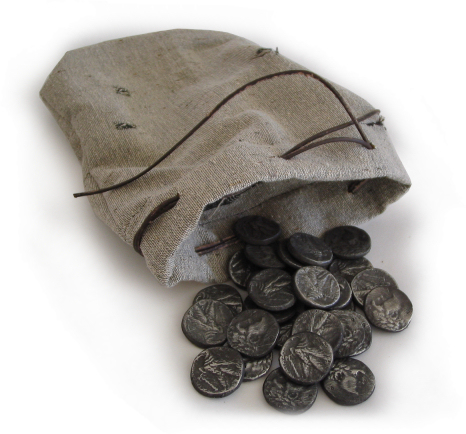
>10. What did the Lord do with the second staff? (14)
* Zechariah 11:14 "Then I broke my second staff called Union, breaking the brotherhood between Judah and Israel."
* "Then I broke my second staff called Union"
* "breaking the brotherhood between Judah and Israel."
* The union signified the dissolution of the covenant nation, particularly of the unity between the sough and the north. The breaking up of the nation into parties hostile to each other was characteristic of later Jeish history; it greatly hindered the popular cause in the war against Rome. (John 11:48)
>What does foolish shepherd's do? (15-16; John 10:8, 10-13)
* Zechariah 11:15-16 "Then the LORD said to me, "Take again the equipment of a foolish shepherd. For I am going to raise up a shepherd over the land who will not care for the lost, or seek the young, or heal the injured, or feed the healthy, but will eat the meat of the choice sheep, tearing off their hoofs."
* Matthew 9:35-36 "Jesus went through all the towns and villages, teaching in their synagogues, preaching the good news of the kingdom and healing every disease and sickness. When he saw the crowds, he had compassion on them, because they were harassed and helpless, like sheep without a shepherd."
* John 10:8 "All who ever came before me were thieves and robbers, but the sheep did not listen to them."
* John 10:10-13 "The thief comes only to steal and kill and destroy; I have come that they may have life, and have it to the full. I am the good shepherd. The good shepherd lays down his life for the sheep. The hired hand is not the shepherd who owns the sheep. So when he sees the wolf coming, he abandons the sheep and runs away. Then the wolf attacks the flock and scatters it. The man runs away because he is a hired hand and cares nothing for the sheep."
* The Jewish leadership in Jesus' time were selfish and proud. They rejected their God.
>What will happen to such shepherds?
* Zechariah 11:17 "Woe to the worthless shepherd, who deserts the flock! May the sword strike his arm and his right eye! May his arm be completely withered, his right eye totally blinded!"
* "Woe" -Woe means deep sorrow according to the Webster's dictionary. In the Bible woe means more than that. Woe is an expression of sorrow because of known trouble, misfortune and destruction to come because one has not obeyed and/or accepted God and his word.
* "worthless shepherd" -With the true shepherd removed a foolish and worthless shepherd replaces him. A selfish, greedy, corrupt leader will arise and afflict the flock (the people of Israel). This counterfeit shepherd may have found a partial historical fulfillment in such leaders as Simeon bar Kosiba or Kokba (who led the Jewish revolt against the Romans in 132-135 A.D. and who was hailed as the Messiah by Rabbi Akiba). But it would seem that the final stage of the progressive fulfillment of the complete prophecy awaits the rise of the final antichrist (Ezekiel 34:2-4; Daniel 11:36-39; John 5:43; and 2 Thessalonians 2:3-10; Revelation 13:1-8) (NIV Study Bible)
* "May the sword strike his arm" -unable to fight
* "his right eye totally blinded" -poor coordination
* 2 Timothy 3:1-9 "But mark this: There will be terrible times in the last days. People will be lovers of themselves, lovers of money, boastful, proud, abusive, disobedient to their parents, ungrateful, unholy, without love, unforgiving, slanderous, without self-control, brutal, not lovers of the good, treacherous, rash, conceited, lovers of pleasure rather than lovers of God-- having a form of godliness but denying its power. Have nothing to do with them. They are the kind who worm their way into homes and gain control over weak-willed women, who are loaded down with sins and are swayed by all kinds of evil desires, always learning but never able to acknowledge the truth. Just as Jannes and Jambres opposed Moses, so also these men oppose the truth--men of depraved minds, who, as far as the faith is concerned, are rejected. But they will not get very far because, as in the case of those men, their folly will be clear to everyone."

|























